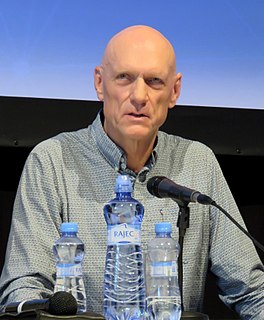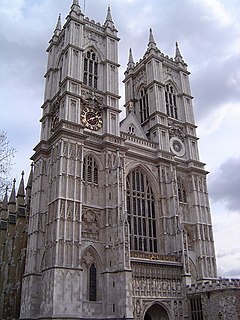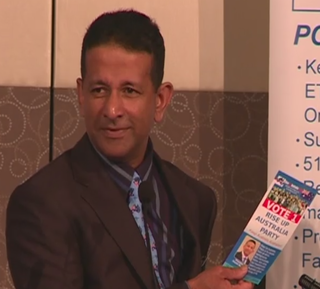Related Research Articles

Peter Robert Garrett is an Australian musician, environmentalist, activist and former politician.

A chaplain is, traditionally, a cleric, or a lay representative of a religious tradition, attached to a secular institution, or a private chapel.

The Freedom From Religion Foundation (FFRF) is an American non-profit organization, which advocates for atheists, agnostics, and non-theists. Formed in 1976, FFRF promotes the separation of church and state, and challenges the legitimacy of many federal and state programs that are faith-based. It supports groups such as nonreligious students and clergy who want to leave their faith.

The Royal Army Chaplains' Department (RAChD) is an all-officer corps that provides ordained clergy to minister to the British Army.

Religion in the United Kingdom, and in the countries that preceded it, has been dominated for over 1,000 years by various forms of Christianity, replacing Celtic and Anglo-Saxon paganism as the primary religion. Religious affiliations of United Kingdom citizens are recorded by regular surveys, the four major ones being the national decennial census, the Labour Force Survey, the British Social Attitudes survey and the European Social Survey.

Daniel "Danny" Nalliah is a Sri Lankan Australian evangelical Christian pastor and young earth creationist. He was the leader of the now-dissolved Rise Up Australia political party and is the president of Catch the Fire Ministries. Nalliah defended against a lawsuit brought by the Islamic Council of Victoria under Victoria's Racial and Religious Tolerance Act. In this case, Judge Michael Higgins found in favour of the Islamic Council of Victoria, which took the action against Catch the Fire, but his decision was overturned by the Victorian Court of Appeal.

A military chaplain ministers to military personnel and, in most cases, their families and civilians working for the military. In some cases they will also work with local civilians within a military area of operations.

Religion in Australia is diverse. Section 116 of the Constitution of Australia of 1901 prohibits the Commonwealth government from establishing a church or interfering with the freedom of religion. In an optional question on the 2016 Census, 52.2% of the Australian population declared some variety of Christianity. Historically the percentage was far higher; now, the religious landscape of Australia is changing and diversifying. According to the 2016 estimate, religious distribution is as follows: Protestant 23.1%, Roman Catholic 22.6%, other Christian 4.2%, Muslim 2.6%, Buddhist 2.4%, Orthodox 2.3%, Hindu 1.9%, other 1.3%, none 30.1%, unspecified 9.6%. In 2016, 30.1% of Australians stated "no religion" and a further 9.6% chose not to answer the question. Other faiths include Sikhs (0.5%) and Jews (0.4%).

The Royal Canadian Chaplain Service is a personnel branch of the Canadian Armed Forces that has approximately 192 Regular Force chaplains and 145 Reserve Force chaplains representing the Christian, Muslim and Jewish faiths. From 1969 to 2014 it was named the Chaplain Branch. It was renamed on October 16, 2014.
Pastoral care is an ancient model of emotional, social and spiritual support that can be found in all cultures and traditions. The term is considered inclusive of distinctly non-religious forms of support, as well as support for people from religious communities.

The Chaplain Corps of the United States Army consists of ordained clergy of multiple faiths who are commissioned Army officers serving as military chaplains as well as enlisted soldiers who serve as assistants. Their purpose is to offer religious church services, counseling, and moral support to the armed forces, whether in peacetime or at war.
Neopagans are a religious minority in every country where they exist and have been subject to religious discrimination and/or religious persecution. The largest Neopagan communities are in North America and the United Kingdom, and the issue of discrimination receives most attention in those locations, but there are also reports from Australia and Greece.
The Australian Army Chaplains' Department is an all-officer Corps within the Australian Army that provides ordained clergy to minister to the personnel of the Australian Army. As of 2012, there are 67 serving regular chaplains in the Australian Army; these belong to either one of several Christian churches, or to the Jewish faith. There are also 83 chaplains in the Australian Army Reserve.
A sports chaplain provides pastoral care for the sports community, including athletes, coaches, administrators and their families. In 2017, a Global Summit of Sports Chaplaincy ministries defined sports chaplaincy as “ongoing pastoral and spiritual care, by permission, to those of faith or no faith, for the holistic well-being of all involved in the community of sport.” Different sports and cultures may adopt the practice of sports chaplaincy but under different titles - Sports Mentor, Life Coach, Character Coach. Consequently, the practical outworking of sports chaplaincy in wide in scope, but broadly fits into 5 models of delivery but it is primarily a relational approach.
The Royal Air Force Chaplains Branch provides military chaplains for the Royal Air Force of the United Kingdom.

The Chaplain of the United States House of Representatives is the officer of the United States House of Representatives responsible for beginning each day's proceedings with a prayer. The House cites the first half of Article 1, Section 2, Clause 5 in the United States Constitution as giving it the authority to elect a Chaplain, "The House of Representatives shall choose their speaker and other officers".

United States military chaplains hold positions in the armed forces of the United States and are charged with conducting religious services and providing counseling for their adherents. As of 2011, there are about 2,900 chaplains in the Army, among the active duty, reserve, and National Guard components.
The National School Chaplaincy Programme (NSCP), between 2011 and 2014 known as the National School Chaplaincy and Student Welfare Programme, is an Australian federal government programme which funds chaplains in Australian primary and secondary schools. The chaplains are to provide "support and guidance about ethics, values, relationships and spirituality", and is based on pastoral care, not religious instruction. The grants are $20,000 a year for schools and $24,000 for schools in remote areas.
The status of religious freedom in South America varies from country to country. States can differ based on whether or not they guarantee equal treatment under law for followers of different religions, whether they establish a state religion, the extent to which religious organizations operating within the country are policed, and the extent to which religious law is used as a basis for the country's legal code.
Isabelle E. Merry (1907–2002) was an Australian Congregational minister and chaplain at Queen Victoria Hospital in Melbourne, Victoria. She was the first woman accepted for theological studies at the Congregational College of Victoria. She was ordained to the Christian ministry in 1927, becoming the first woman to be ordained in the state of Victoria. She became a full-time chaplain at Queen Victoria Hospital in Melbourne, and was the first chaplain to be on the staff of a hospital in Australia. In 1976, she was awarded an OBE for her chaplaincy work.
References
- 1 2 "Current details for ABN: 59 004 240 779". business.gov.au. 9 March 2010. Retrieved March 13, 2014.
- ↑ "Introduction". Access Ministries. Retrieved March 13, 2014.
- ↑ "Mission and Vision Statement". Access Ministries. Retrieved March 13, 2014.
- ↑ Wilberforce, Stephen. "A history of state education in Victoria". Internet Archive . Retrieved March 13, 2014.
- ↑ "Council for Christian Education in Schools (Vic.)". NLA Trove . Retrieved March 13, 2014.
- ↑ "Church Support". Access Ministries. Retrieved September 5, 2017.
- ↑ "Access Ministries Prayer Diary" (PDF). Access Ministries. February 2014. Archived from the original (PDF) on March 14, 2014. Retrieved March 13, 2014.
- ↑ "CEO - Evonne Paddison". Access Ministries. Retrieved March 13, 2014.
- 1 2 Marshall, Konrad; Butler, Ben (March 6, 2014). "Pressure builds on state's religious instruction educator". The Age . Retrieved March 6, 2014.
- ↑ "About AMTI". Access Ministries. Retrieved March 13, 2014.
- ↑ Marshall, Konrad (22 February 2014). "Access Ministries asserts its right to teach religion in schools". The Age . Retrieved 27 February 2014.
- 1 2 3 Marshall, Konrad (February 17, 2014). "Primary school principals shut down religious education classes". The Age . Retrieved February 23, 2014.
- ↑ Konrad Marshall (December 21, 2014). "Religious instruction faces massive enrolments drop, funding uncertainty". The Age.
- 1 2 Cohen, Hagar (31 August 2014). "Parents flee Access Ministries religion classes". ABC. Archived from the original on March 27, 2020.
- ↑ "Why Chaplaincy?". Access Ministries. Retrieved March 13, 2014.
- ↑ "About National Schools Chaplaincy and Student Welfare Program (NSCSWP)". Access Ministries. Retrieved March 28, 2014.
- ↑ "Become an ACCESS Chaplain or Student Wellbeing Worker". Access Ministries. Retrieved March 13, 2014.
- ↑ Hastie, David (31 March 2014). "Big Secularism or the Australian Sprawl? Why Marion Maddox is Wrong about Christian Education". ABC. Retrieved 2 April 2014.
- ↑ "IQ2 Debate: Faith-based Religious Education Has No Place in Public Schools". ABC, Big Ideas. 27 March 2014. Retrieved 2 April 2014.
- ↑ Zwartz, Barney (September 17, 2011). "Church to probe Access". The Age . Retrieved 21 September 2011.
- ↑ O'Brien, Susie (May 24, 2011). "Religious education instructors in schools after just hours of training". Herald Sun . Retrieved 3 September 2011.
- ↑ McCauley, Dana (October 1, 2013). "St Kilda mum shines a light on informed consent in religion debate". Herald Sun . Retrieved October 1, 2013.
- ↑ Topsfield, Jewel (May 13, 2011). "School religion classes probed". The Age . Retrieved 3 September 2011.
- ↑ "ACCESS Ministries Report". Australian Government, Department of Education. 28 November 2011. Archived from the original on 10 February 2014. Retrieved 3 March 2014.
- ↑ Peter, Garrett (July 20, 2011). "Dear Canon Paddison" (PDF). Access Ministries. Retrieved March 13, 2014.
- ↑ Maddox, Marion. "The Church, The State and the Classroom" (PDF).Cite journal requires
|journal=(help) (2011) 34(1) University of New South Wales Law Journal 300. - ↑ Bachelard, Michael (April 3, 2011). "Priest slams religion curriculum as 'appalling'". The Age . Retrieved March 3, 2014.
- ↑ Topsfield, Jewel (May 20, 2011). "Chaplain joins religion row". The Age . Retrieved March 13, 2014.
- ↑ Jody O'Callaghan (26 Feb 2015). "School kids taught 'God created everything'". Stuff.co.nz.
- ↑ O'Brien, Susie (December 14, 2012). "Christmas season 'hijacked' by creationists". Herald Sun . Retrieved December 14, 2012.
- ↑ Jill Stark (February 22, 2014). "Uproar at 'Biblezine' sex tips for kids". The Age . Fairfax Media . Retrieved February 22, 2014.
- ↑ "Access Ministries under scrutiny after 'inappropriate and offensive' material given out at Victorian primary school". Australian Broadcasting Corporation. Retrieved 5 June 2014.
- ↑ Topsfield, Jewel (May 6, 2011). "Teacher fury over God comic". The Age . Retrieved 3 September 2011.